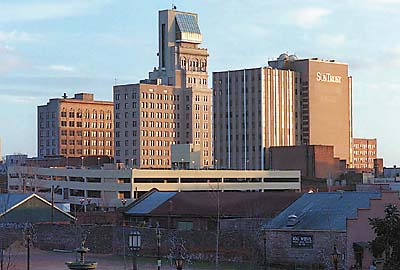Cities around the country constantly aim to increase their innovative competitiveness. The city of Augusta, Georgia, continues to emphasize this goal to boost the local economy. After thorough research, the McNair Center generated suggestions to help Augusta’s leaders drive this growth.
The Ideal Situation for Growth
Although there are more than 28 million firms in the U.S., economic growth comes disproportionately from only a tiny fraction. More than half of growth in the American economy comes from these “High-Growth, High-Tech” (HGHT) enterprises. HGHT firms grow from nothing to IPO in a very short period, about 5-6 years.
HGHT firms desire areas with abundant funding. This includes venture capital (VC) funding, angel investors and crowd funding, government grants and contracts, and research and development (R&D) opportunities.
To support HGHT firms, certain systems and mechanisms must also be in place. Factors like accelerators, incubators and collaboration hubs all attract firms by creating innovation communities.
Evaluation of Current Situation
Augusta does not have a strong entrepreneurship record. With only one VC deal in the last few decades, it seems clear that entrepreneurs are not flocking to Augusta. The city’s lack of resident corporations with big R&D expenditure also indicates that innovation culture isn’t strong.
In terms of mentorship and support, there are no accelerators in Augusta, and only one incubator. The lone incubator, The Clubhou.se, was founded in 2012. They have 80 members, and boast that they “have helped 60 entrepreneurs grow 32 companies that create 90 jobs and a $7,000,000 annual economic impact in our community.” The Clubhou.se is yet to have a venture-backed success.
New or higher performing accelerators and incubators are necessary to attract large amounts of innovative firms. Right now, some of Augusta’s strongest innovation advocates are spearheading another entrepreneurship resource, the Augusta Innovation Zone. The Innovation Zone hopes to act as a physical hub for Augusta’s entrepreneurs.
Government grants and contracts, however, have a relatively strong presence in Augusta. With over 1,000 contracts and 200 grants from agencies like the Department of Defense and Department of Health and Human Services in the last ten years, Augusta has a clear ability to attract government work and win government grants.
Local Competition
Atlanta, the closest large city to Augusta, is currently ranked 26th for HGHT entrepreneurship among U.S. cities. Boasting $117 million VC invested, 6 new deals and 100 active startups in 2016, Atlanta is performing well. However, this is not performance that labels it as a leader in innovation. Atlanta’s ranking for startup density has dropped nine places relative to its rank in 2015. Although Atlanta is not a top performer, Augusta can expect a difficult relationship with Atlanta. Entrepreneurs tend to prefer strong entrepreneurship ecosystems, and Atlanta will be stronger than Augusta for the foreseeable future.
The Path Forward
The upcoming relocation of U.S. Cyber Command to Augusta, and the existing partnerships with local Fort Gordon, offer strong opportunities for growth in Augusta.
Perhaps the clearest path forward will be for Augusta to build off its current competency in receiving government contracts and grants. It could put together resources to make it easier for startups to apply for grants and provide government contract work. This strategy should attract new startups.
Working with the government often requires security clearances. In Augusta, this may create issues for startups who cannot obtain clearances. But there are many established firms whose employees already have clearances – Booz Allen for example has a large presence in Augusta. If these firms had incentives to partner with startups to jointly win grants and contracts, then an accelerator or an incubator could act as a hubs to bring everyone together. Some famous ecosystem institutions elsewhere, like 1776 in Washington, D.C., owe much of their success to their roles as middlemen, running competitions, brokering joint contracts and enabling startup research.
Cooperation is Key
For this all to work, everyone – Augusta University, US Cyber Command, local government, established firms, ecosystem organizations and the startups themselves – all need to be in close proximity. The startups will also need help to allow them to focus on exclusively on fast-paced development.

McNair Center Director Ed Egan sees potential in the future developments of Augusta. A new $60 million building named the Hull McKnight Georgia Cyber Innovation and Training Center (GCITC), built in partnership with the State of Georgia, Augusta University, and others, is currently under construction. It is located on the waterfront, just blocks away from the Broad Street strip. Egan posits that this is the best location for Augusta to try to create a startup scene.
Egan explains, “The GCITC could house much more than just cyber-related innovation. It could be the home to The Clubhou.se and The Innovation Zone, host drop-in offices for incumbents like Booz Allen, and be a place for U.S. Cyber Command and government agencies like the National Security Agency to host competitions and workshops.” Augusta has its own unique challenges, but, with the right approach and leveraging the GCITC, it could build its own unique ecosystem.

